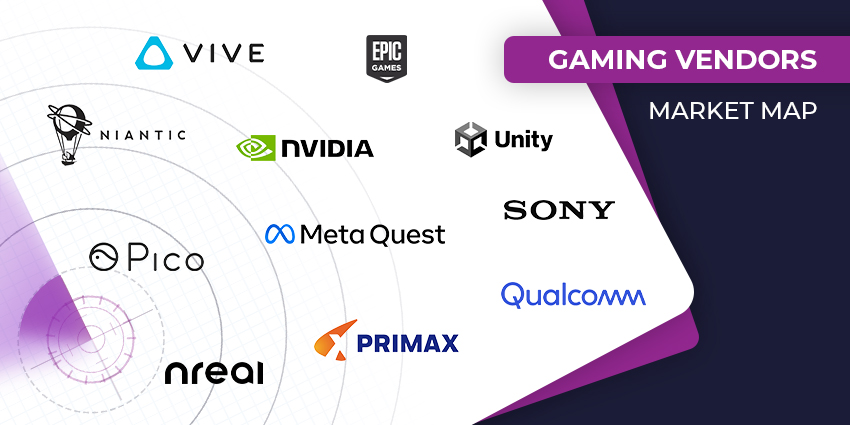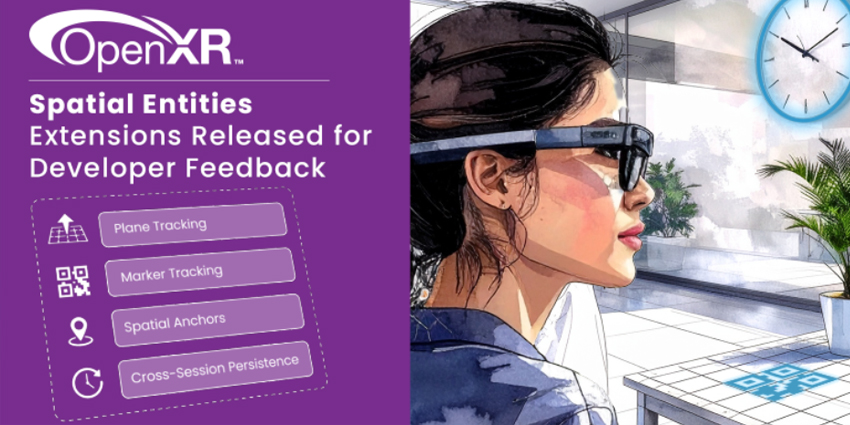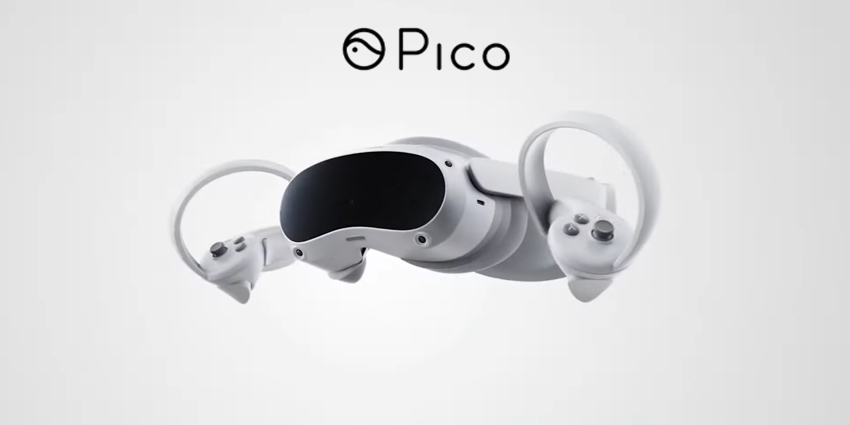XR gaming companies have rapidly entered the mainstream entertainment landscape in recent years. While the potential of the evolving XR market (set to reach a value of $472.39 billion by 2029) extends far beyond gaming, the sector still takes up a large segment of the XR space.
Around the world, vendors are producing gamified immersive experiences that delight consumers and pave the way for new forms of education and team-building initiatives.
We examined the current landscape to bring you this list of some of the most impressive XR gaming innovators, introducing new experiences in 2024.
The article provides a snapshot of the vendors featured in our Gaming Marketplace.
- Epic Games
- Unity
- Nvidia
- Sony
- Qualcomm
- Niantic
- Meta
- PICO
- Pimax
- HTC VIVE
- Nreal
Epic Games
One of the better-known XR gaming companies, Epic Games, is responsible for one of the most popular development engines for extended reality. The Unreal Engine solution offers a host of tools developers can use to build augmented, virtual, and extended reality experiences. Aside from supporting game developers, the engine also empowers the creation of immersive business applications and resources.
Epic Games has developed a massive ecosystem of valuable resources that support developers with the design and implementation of realistic digital experiences. The company also offers robust platform support for its ecosystem, integrating with various solutions from vendors like Meta, Microsoft, Leap Motion, Apple, and Google.
Unity
Responsible for one of the world’s largest real-time 3D (RT3D) gaming engines, Unity supports countless companies across various industries with the creation of immersive content. The San Francisco-based firm produces tools that allow companies to build digital twins, metaverse environments, and even immersive collaboration tools for the enterprise.
Unity’s solutions work with various hardware systems and integrate with multiple design and productivity tools. Plus, Unity offers companies and developers access to educational resources, support, and training assets for XR development. The company also partners with vendors like Apple, Adobe, Meta, NVIDIA, Varjo, and many others.
NVIDIA
NVIDIA provides developers and innovators with a comprehensive ecosystem of tools for creating scalable, branded, and bespoke extended reality products. The NVIDIA CloudXR suite supports companies in streaming VR, MR, and AR content from any OpenVR applications on a remote server, with built-in NVIDIA drivers and hardware.
NVIDIA is also responsible for the Omniverse cloud ecosystem, a full-fidelity landscape for building VR extensions and services into gamified environments. Moreover, Nvidia users can also leverage VR capture and replay tools, deep learning super sampling solutions, and the Nvidia VRWorks library of APIs for connecting extended reality solutions.
Sony
Well-known XR gaming company Sony produces hardware and software for the immersive entertainment landscape. The company has invested more than $2 billion into extended reality research. Plus, the organization announced the development of a spatial content creation system and XR head-mounted display at the beginning of 2024.
Sony is also one of the first gaming companies to produce its own dedicated VR headset for the PlayStation console. It also offers MoCap systems to XR initiatives, like avatar development, and has patented a blockchain system to create new immersive technologies.
Qualcomm
Technology and chip giant Qualcomm has invested in a range of metaverse and XR technology solutions for some time. The Qualcomm Snapdragon platform, powered by 5G, is one of the first XR platforms to provide developers with access to artificial intelligence and strong mobile connectivity. Qualcomm also develops solutions for boundless XR experiences with cloud, edge, and 5G processing capabilities.
With Qualcomm’s technology, developers in the gaming industry can access solutions to various technical problems, from display management to motion tracking. Qualcomm also partners with various other XR vendors, ranging from Niantic to T-Mobile, on developing platform solutions in the XR space.
Niantic
Known for its work in developing augmented reality applications, Niantic introduced many companies to the possibilities of AR gaming. The mobile app company gives companies tools for mapping, sharing, and creating immersive experiences. With Niantic’s platform, companies can build games that leverage everything from semantic segmentation to real-time streaming.
Niantic is in the process of building a planet-scale AR alliance, developed to enable creators to share immersive experiences in a range of environments. The company partners with vendors like EE, Verizon, Telstra, and Deutsche Telekom and offers end-to-end support and consulting to creators.
Meta
Best known for its investment in immersive “metaverse” experiences, Meta has an entire “Reality Labs” department committed to extended reality development. The company produces some of the most popular VR and mixed reality headsets, including the Quest Pro and Meta Quest 3. It also produces consumer and business-focused applications, like Meta Horizon Worlds.
Meta also supports companies in creating and promoting virtual reality games with its dedicated Quest store environment and developer toolkit. The brand’s range of services ensures creators can quickly build, distribute, and monetize games and virtual reality apps.
PICO
Virtual reality company PICO produces headsets, software, and platform solutions for developers and gaming companies. The organization has its own app store where consumers can purchase and explore extended reality games and metaverse experiences. Plus, developers can take advantage of a range of robust software solutions.
The PICO OS toolkit is available for building interactive games and immersive content. PICO VR enables companies to leverage virtual reality experiences in a scalable environment. PICO also produces a range of tools, such as the Remote Play assistant for gaming communities, Cast for PICO, and the PICO streaming assistant.
Pimax
Supporting both consumers and enterprises with extended reality experiences, Pimax develops XR headsets with impressive visual fidelity, as well as solutions like the Pimax Portal, a leading 4K hybrid gaming system that supports virtual reality experiences. Pimax also has its own comprehensive application store where developers can list their latest games.
Pimax has its own OpenMR forum environment, a range of developer tools, and a developer portal for creating metaverse experiences. The company is currently working on the development of a range of new headsets that feature cutting-edge screens, intelligent spatial audio, and positional tracking capabilities.
HTC VIVE
With solutions for both consumers and enterprises, VIVE is a well-known XR gaming company, offering both headsets and software solutions. Hardware options range from the VIVE Pro series to the VIVE Focus series, XR Elite, and the VIVE Flow. The company also offers its own streaming services to minimize latency when delivering immersive experiences.
The VIVERSE provides consumers and companies with a metaverse world where they can build and customize community environments with personalized avatars and environments. Users can build exhibitions, design games, and even buy, sell, and trade their virtual assets.
XReal (Nreal)
XReal, previously Nreal is a well-known extended reality company offering both XR gaming and enterprise experiences. The company produces products like the XReal Air 2 smart glasses for augmented reality experiences, as well as the XReal Beam for streaming immersive content. XReal also offers users access to a customizable environment called AR Space.
Consumers can use AR Space to connect with third-party and proprietary immersive content through the Android Nebula app. For developers, Nreal has its own SDK framework available to assist creators in designing full immersive experiences for various devices. The solution supports personalized OTA updates, hand tracking, plane detection, and 6-DOF space recognition.







